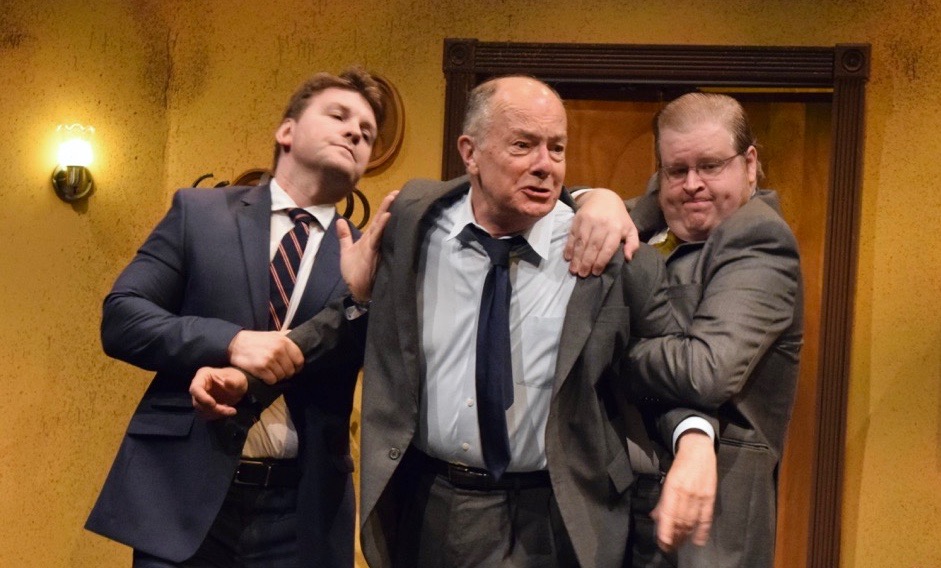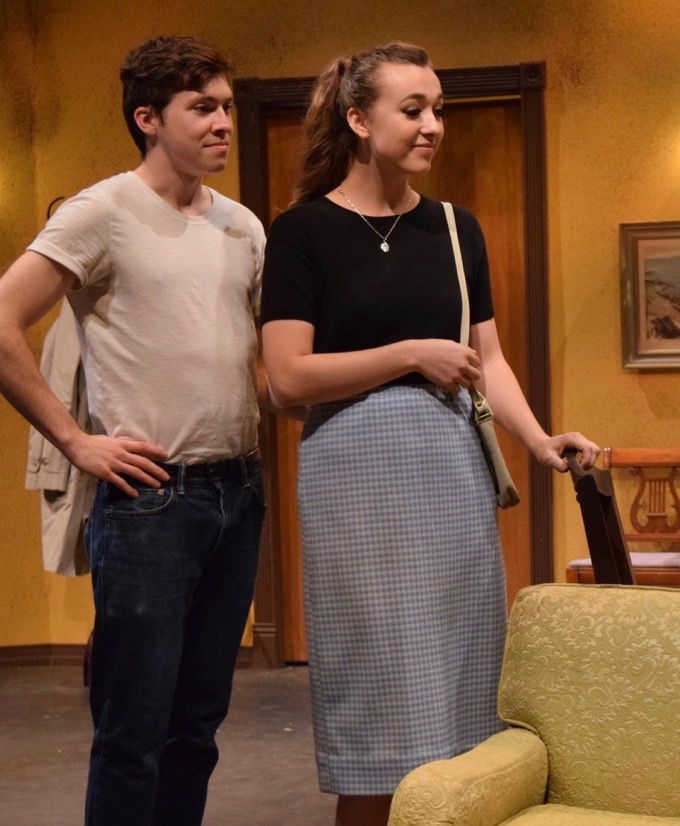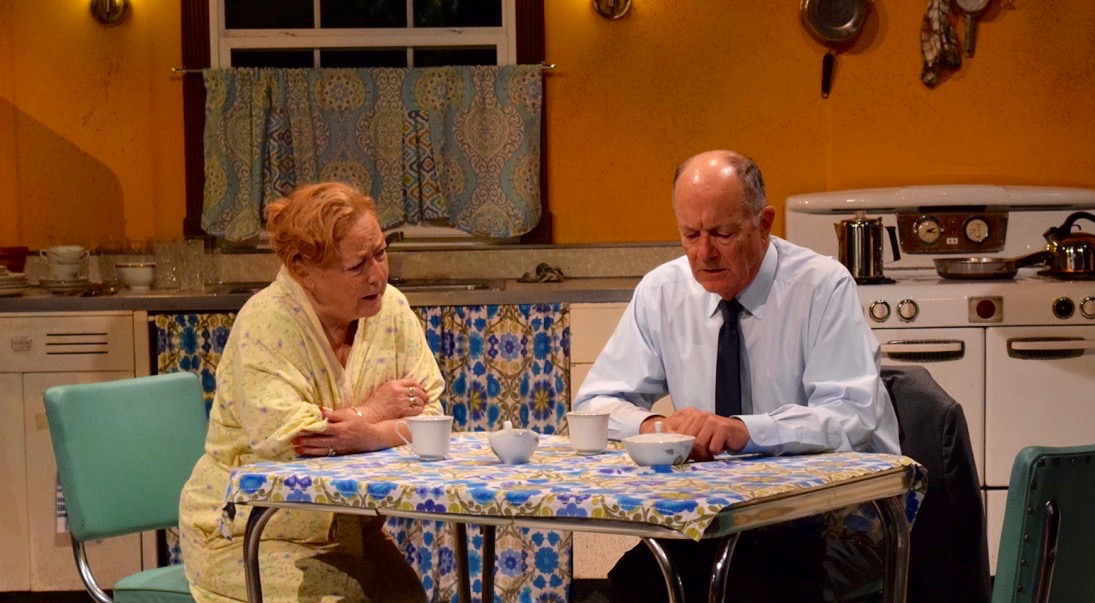‘Come Back, Little Sheba’ Explores the Land of Lost Dreams and Hope for Better Days
- Like
- Digg
- Del
- Tumblr
- VKontakte
- Buffer
- Love This
- Odnoklassniki
- Meneame
- Blogger
- Amazon
- Yahoo Mail
- Gmail
- AOL
- Newsvine
- HackerNews
- Evernote
- MySpace
- Mail.ru
- Viadeo
- Line
- Comments
- Yummly
- SMS
- Viber
- Telegram
- Subscribe
- Skype
- Facebook Messenger
- Kakao
- LiveJournal
- Yammer
- Edgar
- Fintel
- Mix
- Instapaper
- Copy Link

Physician, heal thyself! Doc (Mark Yochum, center) is a doctor who can’t manage it, so Ed (Tom Kolos, L) and Elmo (Eric Mathews, R) are helping him get a grip.
Where do bad decisions come from? Maybe from not having the right data. Maybe from the Devil. But more often, and more likely, from something(s) in our personalities driving us down the wrong road.
How do our lives go downhill? A little bad decision here, a little bad luck there, a lot more riding with that reckless driver—and presto, we wind up someplace we never thought we’d be.
And once we’re stuck at the dreary hotel, what can we do then? Well, there are options. We can pretend it’s just fine, not so bad at all. Or we can take it out on the people around us! Or …
Come Back, Little Sheba explores topics such as these. It’s not a play for those who like their summer theater light and sweet. But for those who want more than a diet of cotton candy, The Summer Company’s revival of the 1950 classic by William Inge runs through July 24.
The ‘50s Factor, the 12-Step Factor, the Hat
Come Back, Little Sheba does have elements that are just plain fun. It includes comical scenes, and nostalgia fans may get a kick out of the authentic 1950s touches: the vintage kitchen furnishings, the big black rotary-dial phone in the living room, the milkman bringing dairy products to the door.
Fans of a modern bent may worry, at first, that the script feels dated. The characters are people raised amid social conventions and morals that are no longer so prevalent in today’s America. Also, the play is not action-packed from the start; the first act builds at a more gradual pace than some today are used to. These concerns evaporate, however, as the story moves along.
The characters in Little Sheba exhibit basic human tendencies and idiocies that haven’t changed. The second act explodes into all the fireworks a person could want. (On the night I went, audience members in the front row were tucking their feet back under their chairs and flinching.) And there is a special attraction built in.
This play should be of particular interest to 12-step audiences. A key character, “Doc” Delaney (Mark Yochum), is an alcoholic in early recovery. He’s been working his AA program with a beaming, I’m-all-better-now smile, which you can tell won’t last. Doc’s emotional swings are powerfully rendered—playwright Inge himself was in AA; Yochum plays the part so well it’s scary—and all is presented in a way that non-12-steppers can appreciate, too, much as in Stephen Adly Guirgis’ recent recovery-based play The Motherfucker with the Hat. Doc, being a properly dressed man of the ‘50s, even has a hat.
Old Coots and Young Peeps

For Turk (George Ramey) and Marie (Lauren Brendel), that sofa looks inviting.
Little Sheba’s plot revolves around a pair of couples. Doc and Lola Delaney (Susan McGregor-Laine) have arrived in late middle age leaving a trail of bad karma. When young, their futures looked bright, until Doc dropped out of medical school to marry beauty queen Lola when she became pregnant—with a baby she then lost—and after further missteps, they’re now in a bright-eyed rebuilding mode. He’s a chiropractor trying to rebuild the practice he drank away, while she is a housewife with faded looks and no children but the hope of a happy home at last.
They’ve taken in a boarder: a college art student named Marie (Lauren Brendel), whom they idolize, seeing her as a sort of proxy daughter and a living reminder of their own youthful zest. One ominous note is Marie’s infatuation with her artist’s model, a churlish campus narcissist who calls himself Turk (George Ramey). The young duo appear to be a match made by a yenta from Hell.
Surely Marie will not repeat the same mistakes Doc and Lola made, will she? And surely the older couple wouldn’t let that shatter their fragile re-start, would they? Have faith. Marie is a creative type, capable of inventing new twists on old errors. And though chaos envelops the Delaneys’ household, it leaves glimmers of light amid the wreckage, indicating where the best path forward might begin.
The Playwright, the Postman, the Naked Truth
Come Back, Little Sheba was a sensation when it opened on Broadway. The play was the first of a string of hits for Inge during the 1950s, all of them made into major movies: this one plus Picnic, Bus Stop, and The Dark at the Top of the Stairs.
Yet the playwright’s life story had an unhappy end. After his dazzling decade, and after winning professional honors to go with commercial success (a Best-Play Tony Award and Pulitzer Prize for Picnic, an Oscar for his screenplay for Splendor in the Grass), somehow Inge wound up like a big-league baseball star reduced to struggling in the minors.
He wrote more but had no more big hits. His brand of mid-century, middle-American psychodrama lost favor. His personal demons, always busy, started working overtime. Inge went off the wagon and in 1973, at the age of 60, committed suicide.
Meanwhile his plays keep coming back, gaining renewed appreciation. Pittsburgh’s The Summer Company has put together a revival of Little Sheba that’s a good entry point to the world of Inge-dom. The production is generally solid with some flashes of brilliance, and on target where it needs to be: in bringing out the characters of Doc and Lola.

Kitchen realism: Lola (Susan McGregor-Laine) tries to impart some to her man.
The trick is to show that these people can be strong despite their flaws and smart despite their ditziness. McGregor-Laine as Lola has a number of nice turns on that score. It’s up to her to either provide or trigger much of the play’s humor, as she does in a memorable early scene.
Home alone on a summer morning, Lola hears the postman at the door. She invites him in for a glass of ice water, then sits with him on the sofa for a brief chat … which she kicks off by telling him that her husband is a recovering alcoholic. The postman (Eric Mathews) responds with a grimacing grin that signals “Too Much Information.”
But Lola is proud of her hubby. She must elaborate. And while she babbles on, Mathews’ postman—without saying a word—delivers the most prolonged and hilarious TMI squirm I have seen.
Lola is also a source of ditzy insights. In a later scene, she and Doc are discussing the subject of artists’ models. Neither knows much about art but they’ve observed Turk posing for Marie, clad only in his bulging briefs, which Lola has found fascinating but naughty. Doc explains that male models often do so, and that female models pose fully naked.
To Lola this is shockingly unfair. Persistently she badgers Doc on the point: If the men get to cover up, “How come the women are naked?!”
The line speaks volumes. So does a lot of Come Back, Little Sheba.
Closing Credits and Ticket Info
Inge’s Come Back, Little Sheba is directed for The Summer Company by Justin Sines. The Summer Company, formed in the 1990s by theater artists associated with Duquesne University and Carlow University, focuses on staging “classical and soon to be classic plays,” predominately from American writers. Through July 24 at the Genesius Theater on the Duquesne campus, corner of Seitz St. and Locust St., Uptown. For showtimes and tickets visit The Summer Company online.
Photos courtesy of the company.
Share on Social Media
- Like
- Digg
- Del
- Tumblr
- VKontakte
- Buffer
- Love This
- Odnoklassniki
- Meneame
- Blogger
- Amazon
- Yahoo Mail
- Gmail
- AOL
- Newsvine
- HackerNews
- Evernote
- MySpace
- Mail.ru
- Viadeo
- Line
- Comments
- Yummly
- SMS
- Viber
- Telegram
- Subscribe
- Skype
- Facebook Messenger
- Kakao
- LiveJournal
- Yammer
- Edgar
- Fintel
- Mix
- Instapaper
- Copy Link
Follow Entertainment Central
Sign up for the EC Newsletter
Latest Stories







